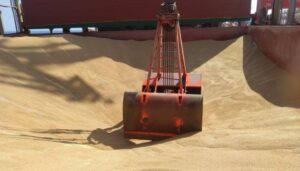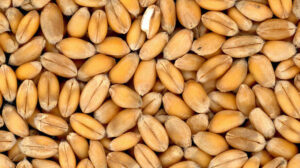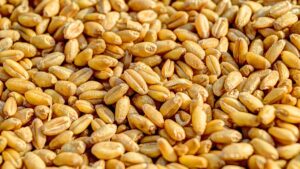
Grain and oilseed exports from Ukraine in 2023 will drop by a third to 46 million tons per year, Agrarian Policy Minister Mykola Solsky said at a meeting of the Agriculture and Fisheries Council in Brussels on Tuesday.
“Compared to last year, this year’s exports of grain and oilseed crops from Ukraine are expected to decrease by a third to 46 million tons per year. Consequently, Ukraine will be able to export less grain than last year by 40%,” the press service of the Ministry of Agrarian Policy quoted the minister’s speech to European colleagues.
European Commissioner for Agriculture Janusz Wojciechowski also said at a press conference after the meeting of the agrarian ministers that the EU expects Ukraine to reduce its exports in 2023 because “the country has limited cultivated areas and expects a 40% lower harvest”.
He expressed confidence that this factor will improve the organization of “routes of solidarity” and send “all exports through them.
Wojciechowski positively assessed the prolongation of exports within the framework of the Black Sea Grain Initiative, which “will facilitate the export of grain from Ukraine for two months”.
The European Commissioner also recalled the need to take into account the situation with the possible blocking of exports of Ukrainian agricultural products “as it already happened before” through the Black Sea grain corridor and urged to consider the total volume of Ukrainian exports when planning the work of “solidarity corridors”.

The European Union (EU) and Ukraine need to find a solution that would allow Ukrainian farmers to work, exporting grain to the EU in the volumes they need, Croatian Minister of Agriculture Marija Vučković said at an online meeting with Ukrainian Minister of Agrarian Policy Mykola Solsky on Tuesday.
Vučković is confident that the restrictions on the export of Ukrainian agricultural products to Europe, which were introduced by the European Commission until June 5, should not be extended after this date, the press service of Ukraine’s Ministry of Agrarian Policy and Food said.
Solsky, in turn, thanked his colleague for understanding. He also said that Croatia became one of the signatories of the letter of the European Commission sent by the relevant ministers of 14 states of the European Union. In this appeal, they expressed concern about the temporary ban on importing Ukrainian agricultural products to five states of the European Union.

Ukrainian agrarians last week sowed 585.2 thousand hectares of grain and leguminous crops, compared to 1 million 105.5 thousand hectares last week and 1267.2 thousand hectares a week earlier, the Ministry of Agrarian Policy and Food reported on Friday.
According to it, May 25, the area under spring grain and leguminous crops reached 5.278 million hectares, or about 96.7% of the planned.
Spring sown areas are still lower than last year, when as of May 26 they reached 5.905 million hectares, but the lag has decreased again: 267.1 thousand hectares were sown during the same week in 2022.
The lag is mainly formed due to the most popular crops – corn and spring barley. They were sown by 16.4% and 17.8% less than last year, amounting to 3.266 and 759.6 thousand hectares respectively. As for corn, they have already surpassed the forecast of the Ministry of Agrarian Policy in 3.618 million hectares, while the barley is noticeably lower than the expected 1.041 million hectares.
At the same time, the area under other crops is already higher than a year ago. This concerns spring wheat – 261.9 thousand hectares (38.4%), buckwheat – 83.1 thousand hectares (44.0%), millet – 46.1 thousand hectares (11.6%) and pea – 135.6 thousand hectares (7.7%).
As it was noted by the Ministry of agrarian policy, the leaders in field work with grains and legumes this week were agrarians of the northernmost Chernigiv region – 94.5 thousand hectares, and the most sown spring crops in Poltava region – 626 thousand hectares.
According to the Ministry of Agrarian Policy, sunflowers covered 4.616 million hectares, which is already 8.2% more than last year’s figure, but still significantly below the expectations of 5.641 million hectares. Most of all this oilseed crops are planted in Kirovograd region – 576 thousand hectares.
Sown areas under sugar beet, on the contrary, exceeded the forecast of 220 thousand hectares and reached 240.9 thousand hectares, a third more than last year on that date, and higher even than in 2021, when they amounted to 226 thousand hectares.
Soybean area expanded to 1.636 million hectares and exceeded last year’s already 42%, and there is little left to the forecast of 1.841 million hectares. Kiev region is the leader with 188.8 thousand hectares.
According to the forecast of the Ministry from the end of March, in 2023 sowing areas of cereals and leguminous crops will amount to 10.24 mln ha, which is 1.4 mln ha less then in 2022, while oilseeds area will grow by 0.92 mln ha – to 8.85 mln ha. In particular, winter wheat crops will be 4166 thousand hectares (-834 thousand hectares against the previous year), spring wheat – 285 thousand hectares (+67 thousand hectares), winter barley – 536 thousand hectares (-255 thousand hectares).

Agrarian ministers of Moldova, Romania and Ukraine in online talks on Friday agreed to exchange information on the amount of wheat to be transported through solidarity corridors, the official website of Moldova’s agrarian ministry reported.
“The purpose of the meeting of the three parties was to agree on a way to organize in order to optimize the transit of grain coming from Ukraine so that Romanian agrarians can transport grain, release warehouses and export products of the new harvest,” the report said.
According to the press service of the Ukrainian ministry, Minister of Agrarian Policy Mykola Solskyi paid special attention to the discussion of transit of Ukrainian agricultural products on the territory of Moldova and Romania.
The trilateral meeting was preceded by negotiations of Romanian Deputy Prime Minister and Minister of Agriculture Vladimir Bol with his Moldovan counterpart Petre Dea. They discussed Moldovan-Romanian cooperation in the agro-industrial sector, mechanisms of financial and non-financial incentives for agricultural producers, as well as the portfolio of projects that are already implemented and planned for implementation.

Ukrainian President Volodymyr Zelenskyy believes that there is “politics” in the decisions of a number of countries that have banned imports of Ukrainian grain.
“I am grateful to my neighbors who support us, but to be honest, there is politics there. We have the Black Sea blocked and we need help with weapons. We can’t risk relations with some countries,” he said Saturday in an interview with Italian media.
“And I understand that some political currents are taking advantage of this situation and instigating farmers to block grain shipments. But they have no right to block transit,” he said.
“We will solve these issues,” Zelensky stressed.

The Lithuanian government may help Ukraine export up to 1 million tons of grain by rail after Poland temporarily banned grain imports from Ukraine, said Lithuanian Economy and Innovation Minister Ausrini Armonaitė.
“The port of Klaipeda and Lithuanian Railways can play an important role in creating momentum to help Poland resolve the situation and guarantee grain exports outside the EU. Lithuania could help safely transport up to 1 million tons of grain from Ukraine by rail. This would be a real solution for Ukraine and a benefit for Poland,” Verslo zinios quoted the minister as saying.
In turn, the president of the Association of Lithuanian Sea Cargo Companies Vaidotas Shileyko noted that the port of Klaipeda is able to process more than 1 million tons of grain a year, but because of the difficult logistics, it is impossible to import more.
“Lithuanian railroads started transporting small volumes of Ukrainian grain through Poland to the port of Klaipeda last May. The main problem here is different railway gauges: Ukraine and Lithuania still use Russian gauges, while Poland uses European ones, which means that rolling stock has to be changed at the border,” he explained.